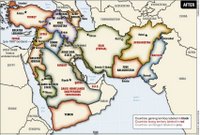Dangerous Games
 To play around with maps is a game not without its dangers.
To play around with maps is a game not without its dangers.With this I mean to start to entertain ideas about changing the borders and shapes of existing states, in the meantime also looking at the possibility of creating new ones.
Games like these sometimes have the tendency to inspire fears and ignite hopes that can start a circle that ends up in violence and even war.
This is the case particularly when those playing the games are suspected of having the power to actually influence the course of events.
That’s why I was somewhat alarmed when I come across a piece in the recent issue of the US publication Armed Forces Journal.
AFJ is a serious publication, although in no way necessarily reflecting US policy on different issues. Nevertheless there is always the risk that things in it will be seen as reflecting – in the one way or the other – thinking going on in US military circles.
It’s all about fundamentally redrawing virtually all the borders of the Middle East.
Thus, it is a recipe for a series of serious wars throughout the region.
You can see the map of the changes that the author wants to impose or arrange in a small version above. But you could of course also have a look at the article as a whole as well as a larger version of the map.
Iraq is bad enough with the risks of a three-way split of that state as a result of a civil war.
But here it’s not only a question of cutting up Iraq. Here we see Iran, Turkey and Saudi Arabia deprived of substantial parts of their territories and, in the later case, even of something they see as the core reason for their existence.
The likelihood that any of them would even come close to contemplating the peaceful acceptance of such changes are smaller than nil. They will all see thoughts like these as a call to arms – the earlier the better.
Why AFJ sees it as relevant to publish thoughts like these is beyond me. They must know that there is no chance whatsoever of any responsible administration in Washington even coming close to ideas like these.
But they can not be ignorant of the fact that the mere suspicion that the article is just a wild piece by a wild individual could start to produce political effects of a distinctly negative art.


<< Home